Session 25 - 1 & 2 Peter and Jude
Authors
1 Peter
Peter, "an apostle of Jesus Christ" (1:1) wrote this letter to a group of Christians scattered throughout the northern areas of Asia Minor (modern Turkey - see map), where he may have previously preached the gospel (or they may have been Christians converted on the Day of Pentecost, cf Ac 2:9, who kept in contract through other leaders). They had been dispersed throughout the ancient world and were under intense persecution. If anyone understood persecution, it was Peter. He was beaten, threatened, punished and jailed for preaching the Word of God. He knew what it took to endure without bitterness, without losing hope and in great faith living an obedient, victorious life. This knowledge of living hope in Jesus was the message and Christ's example was the one to follow. His recipients probably included both Jews (he quotes the OT 8 times) and Gentiles (going against the grain in a hostile polytheistic society). Note how he uses "aliens", or foreigners (1:1), to indicate that he was speaking to Christians who were living their lives in such a way that they would have stood out as aliens among the surrounding culture.
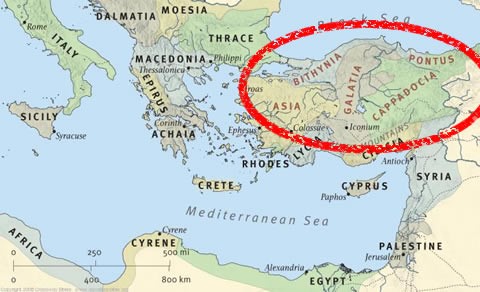
2 Peter
Peter again, describing himself as "a bond-servant and apostle of Jesus Christ". His recipients are "to those who have received a faith of the same kind as ours" (1:1). Only later (3:1) does it become apparent that he is writing to the same group of believers who had received his first letter. Peter was alarmed about false teachers who were beginning to infiltrate the churches. Peter calls on Christians to become strong in their faith so that they can detect and combat apostasy. He strongly stresses the authenticity of the Word of God and the certainty of the return of the Lord Jesus.
Jude
Most scholars identify the writer as Jude the half-brother of Jesus. The brevity of his letter communicates urgency (lit. all diligence = with haste) because false teachers were entering the Christian community (lit. they had crept in unawares, like a robber entering via a widow; there were burglars in the house) and needed to be removed from the church. They were rejecting authority and seeking to please themselves. In response to these events, Jude marshals biblical imagery to make clear what he thinks of it all - from Cain killing his brother Abel to the punishment of the sinful people of Sodom and Gomorrah (7, 11).
Date of Composition
Since Peter was martyred during the reign of Nero, his death must have occurred prior to A.D. 68. He very likely wrote both letters between 66-67. The best evidence for Jude shows it was also written around 67-68.
Purpose and Audience
James, Peter, John and Jude are known as "general epistles", ie written to Christians across a broad canvass, not individuals or specific churches.

This world is not our permanent home.
1 Peter
Peter speaks about persecution, which anticipated the persecution he and other Christians would endure in the final years of Nero's reign. At the time, Peter had not yet been arrested, an event that would lead to his martyrdom around 67-68. Peter has long been thought in some church history circles to have spent time serving the church in Rome, however there is no reliable evidence of this (unless 5:13 is symbolic of Rome). Based on the numerous references to suffering and persecution in this letter, Peter likely wrote as the persecution of Christians under Nero was ramping up.
2 Peter
Peter wrote this sequel soon after 1 Peter. What would have prompted another letter to the same group so soon after the first? From the contents, it appears that he had received reports of false teachers among the churches in Asia Minor. He writes to warn them about the presence of those who spread heresies among the churches (2:1), identifying such this development as a sign of the last days (3:3).
Peter wants to encourage the believers to stand firm and to instruct them on how best to do that. The churches of Asia Minor were not just struggling with the persecution addressed in his first letter; they also had dissension within their ranks. In an effort to stem the tide of false teaching, Peter emphasizes the importance of learning and clinging to the proper knowledge of God. He has a full assurance of his hope in Christ - he recalls vividly what it was like to be with Jesus on the Mount of Transfiguration (1:16-18); no one can take away that very real personal experience and assurance. In fact, the concept of knowing God is so important that the word knowledge appears—in one form or another—some fifteen times in the span of this short letter.
Many of the early Christians were converted Jews who had been well taught in the law and the prophets. When Peter refers to the "word of the prophets" of the Old Testament in 1:19-21, he denounces false prophets and affirms that true prophets were moved by the Holy Spirit who move them/spoke through them (lit. "carried them along").
Jude
Jude's purpose in his short but dense letter is twofold: to expose false teachers (probably antinomians, whose teachings may have been attractive, but they were dangerous, and their condemnation is certain) who had infiltrated the Christian community, and to encourage Christians to stand firm in the faith and fight for the truth. Jude recognizes that false teachers often enter unnoticed, so he seeks to heighten the awareness of the believers by describing in detail how terrible the dissenters actually were and what their behaviour was like. They were actually working against Jesus Christ. The church was to do this by remembering the teaching of the apostles, building each other up in the faith, praying in the Holy Spirit, and keeping themselves in the love of God (17, 20, 21).
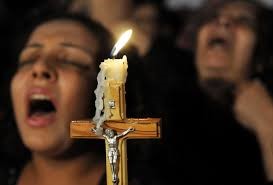
Jude is the only book given entirely to combat false teaching. He admonishes us to "contend" for the faith. False prophets are in the church and the believers are in real danger. Jude's letter is filled with references from the Old Testament, including Israel's Exodus from Egypt (v. 5); Satan's rebellion (v. 6); Sodom and Gomorrah (v. 7); Moses' death (v. 9); Cain (v. 11); Balaam (v. 11); Korah (v. 11); and Enoch (v. 14,15). His use of the well-known historical illustrations of Sodom and Gomorrah's immorality, Cain who killed his brother, corrupt Balaam, and Korah's rebellion reminded the Jewish Christians of the necessity of true faith and obedience.
What about the References to Enoch and Moses?
The First Book of Enoch is a five-part Jewish work composed in stages, beginning perhaps around 200 BC, which circulated widely in Jewish and Christian circles for several centuries. Purportedly written by Enoch, it provides an alternate version of the events leading up to Noah's flood, along with various eschatological teachings. Jude's quote is not the only quote in the Bible from a non-biblical source. Verse 9 is from a text known as the Assumption of Moses. The Apostle Paul quotes Aratus in Ac 17:28 and Epimenides in Titus 1:12 but that does not mean we should give any additional weight to Aratus' or Epimenides' writings. Jude quoting from these "non-canonical" (ie apocryphal) sources does not indicate the entire external texts are inspired, or even true. All it means is that the particular verses are true. (His readers were obviously aware of what he was quoting, so the images must have been part of early Christian tradition, or general awareness.) Vs 17 and 18 appear to have been quoted from what the apostles said on occasion/s, but did not record in any separate text in the NT canon.
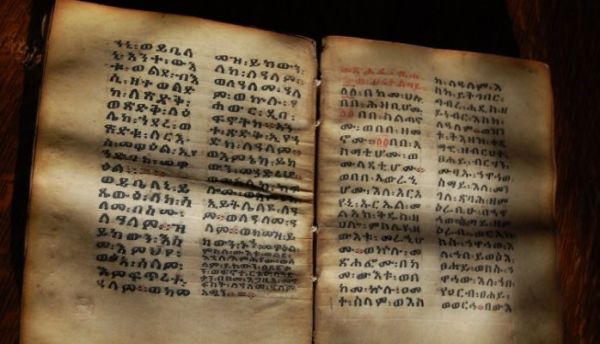
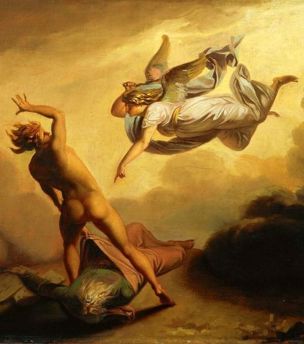
Structure
When studying 1-2 Peter & Jude, one cannot help but notice similarities in Peter and Jude's application of biblical history, and how they use similar terms to denounce sin and false teachers threatening the church. The following comparisons of extracts from 2 Peter and Jude (using the ESV) will help you see the similarities. The early Christian leaders were in frequent contact with one another; letters circulated; accounts were compared; they may simply have drawn on one another's text. Don't read too much into it.
| (2 Peter 1:1) Simeon Peter, a servant and apostle of Jesus Christ, To those who have obtained a faith of equal standing with ours by the righteousness of our God and Savior Jesus Christ: | (Jude 1) Jude, a servant of Jesus Christ and brother of James, To those who are called, beloved in God the Father and kept for Jesus Christ:
|
| (2 Peter 1:2) May grace and peace be multiplied to you in the knowledge of God and of Jesus our Lord. | (Jude 2) May mercy, peace, and love be multiplied to you.
|
| (2 Peter 1:12) Therefore I intend always to remind you of these qualities, though you know them and are established in the truth that you have | (Jude 5) Now I want to remind you, although you once fully knew it, that Jesus, who saved a people out of the land of Egypt, afterward destroyed those who did not believe. |
| (2 Peter 2:1-2) But false prophets also arose among the people, just as there will be false teachers among you, who will secretly bring in destructive heresies, even denying the Master who bought them, bringing upon themselves swift destruction. And many will follow their sensuality, and because of them the way of truth will be blasphemed. | (Jude 4) For certain people have crept in unnoticed who long ago were designated for this condemnation, ungodly people, who pervert the grace of our God into sensuality and deny our only Master and Lord, Jesus Christ. |
| (2 Peter 2:4) For if God did not spare angels when they sinned, but cast them into hell and committed them to chains of gloomy darkness to be kept until the judgment; | (Jude 6) And the angels who did not stay within their own position of authority, but left their proper dwelling, he has kept in eternal chains under gloomy darkness until the judgment of the great day — |
| (2 Peter 2:6) if by turning the cities of Sodom and Gomorrah to ashes he condemned them to extinction, making them an example of what is going to happen to the ungodly; | (Jude 7) just as Sodom and Gomorrah and the surrounding cities, which likewise indulged in sexual immorality and pursued unnatural desire, serve as an example by undergoing a punishment of eternal fire. |
| (2 Peter 2:10a) and especially those who indulge in the lust of defiling passion and despise authority. | (Jude 8) Yet in like manner these people also, relying on their dreams, defile the flesh, reject authority, and blaspheme the glorious ones. |
| (2 Peter 2:10b-12) Bold and willful, they do not tremble as they blaspheme the glorious ones, whereas angels, though greater in might and power, do not pronounce a blasphemous judgment against them before the Lord. Keep your conduct among the Gentiles honorable, so that when they speak against you as evildoers, they may see your good deeds and glorify God on the day of visitation. | (Jude 9-10) But when the archangel Michael, contending with the devil, was disputing about the body of Moses, he did not presume to pronounce a blasphemous judgment, but said, "The Lord rebuke you." But these people blaspheme all that they do not understand, and they are destroyed by all that they, like unreasoning animals, understand instinctively. |
| (2 Peter 2:13) suffering wrong as the wage for their wrongdoing. They count it pleasure to revel in the daytime. They are blots and blemishes, reveling in their deceptions, while they feast with you. | (Jude 12a) These are blemishes on your love feasts, as they feast with you without fear, looking after themselves; |
| (2 Peter 2:15-16) Forsaking the right way, they have gone astray. They have followed the way of Balaam, the son of Beor, who loved gain from wrongdoing, but was rebuked for his own transgression; a speechless donkey spoke with human voice and restrained the prophet's madness. | (Jude 11) Woe to them! For they walked in the way of Cain and abandoned themselves for the sake of gain to Balaam's error and perished in Korah's rebellion. |
| (2 Peter 2:17) These are waterless springs and mists driven by a storm. For them the gloom of utter darkness has been reserved. | (Jude 12b-13) waterless clouds, swept along by winds; fruitless trees in late autumn, twice dead, uprooted; wild waves of the sea, casting up the foam of their own shame; wandering stars, for whom the gloom of utter darkness has been reserved forever. |
| (2 Peter 2:18) For, speaking loud boasts of folly, they entice by sensual passions of the flesh those who are barely escaping from those who live in error. | (Jude 16) These are grumblers, malcontents, following their own sinful desires; they are loud-mouthed boasters, showing favoritism to gain advantage. |
| (2 Peter 3:1-2) This is now the second letter that I am writing to you, beloved. In both of them I am stirring up your sincere mind by way of reminder, that you should remember the predictions of the holy prophets and the commandment of the Lord and Savior through your apostles, | (Jude 17) But you must remember, beloved, the predictions of the apostles of our Lord Jesus Christ. |
| (2 Peter 3:3) knowing this first of all, that scoffers will come in the last days with scoffing, following their own sinful desires. | (Jude 18) They said to you, "In the last time there will be scoffers, following their own ungodly passions." |
| (2 Peter 3:14) Therefore, beloved, since you are waiting for these, be diligent to be found by him without spot or blemish, and at peace. | (Jude 24) Now to him who is able to keep you from stumbling and to present you blameless before the presence of his glory with great joy, |
| (2 Peter 3:18) But grow in the grace and knowledge of our Lord and Savior Jesus Christ. To him be the glory both now and to the day of eternity. Amen. | (Jude 25) to the only God, our Savior, through Jesus Christ our Lord, be glory, majesty, dominion, and authority, before all time and now and forever. Amen. |
Key Issues
Peter
Given the context of persecution and false teaching, an important reminder in 1 Peter is the incredible hope that we have in Christ. Jesus' resurrection changed everything. That hope is like a bright light shining in the darkness. We have great expectation, an inheritance, God's saving power to keep us, a source of "inexpressible joy". We have been saved from empty lives. We are nourished and enabled to grow as Christians. We love Him, even though we have not yet seen Him. We receive his undeserved mercy.
Peter goes to some length to codify how slaves, wives, husbands, elders, young men, indeed all Christians, should live and relate (1 Pet 2:13-3:12).
Being in close proximity to Jesus Christ for more than three years had provided Peter the best possible example of what it looked like to live in holiness amid a hostile world. More than any other, Jesus modeled that lifestyle. Peter therefore points his readers to Jesus. Peter calls Christians to "sanctify Christ as Lord" in their hearts, that they might live and act as Jesus desires (3:14-18). This would include submission to authority - even unjust authority - in government (compare Paul's similar instruction in Rom 13:1-7), in the home, and in the workplace. Jesus becomes the focal point for ordering our lives in the midst of trials and tribulations. By rooting our perseverance in His person and work, we have hope in times of suffering.
Peter's theme in his second letter is a simple one: pursue spiritual maturity through the Word and work of God as a remedy for false teaching and a right response in light of Christ's second coming (1:3, 16 and Ch. 3. Only the book of Revelation says more about the cataclysmic impacts of the Day of the Lord than Peter does here).
When false teachers are at work, the body of Christ begins to fracture and break apart, to lose what makes it distinctive in the first place - faith in the unique person and work of Jesus Christ. Peter repeatedly points to the Word of God as the primary means of growth for the Christian (1:4, 19-21; 3:1-2, 14-16). He encourages his readers to apply themselves to acquiring the true knowledge of God and living out the life of faith with "all diligence," so that we may "be found by [Jesus] in peace, spotless and blameless" (1:5; 3:14). If we do not follow this advice, we surrender the Christian community to false teachers, people who seek to "exploit us with false words" (2:3).
Jude
Covered above. But remember: defections from revelation, sound teaching and godly living, and pursuit of people with their own agendas instead of the purposes of God are to be expected in every generation.
For Reflection:
Think about the following verses. How can you apply them in your personal life?
- 1 Peter 1:3, "Praise be to the God and Father of our Lord Jesus Christ! In his great mercy he has given us new birth into a living hope through the resurrection of Jesus Christ from the dead."
- 1 Peter 2:9, "But you are a chosen people, a royal priesthood, a holy nation, a people belonging to God, that you may declare the praises of him who called you out of darkness into his wonderful light."
- 1 Peter 2:24, "He himself bore our sins in his body on the tree, so that we might die to sins and live for righteousness; by his wounds you have been healed."
- 1 Peter 5:8-9, "Be self-controlled and alert. Your enemy the devil prowls around like a roaring lion looking for someone to devour. Resist him, standing firm in the faith, because you know that your brothers throughout the world are undergoing the same kind of sufferings."
- 2 Peter 1:3-4, "His divine power has given us everything we need for life and godliness through our knowledge of Him who called us by His own glory and goodness. Through these He has given us His very great and precious promises, so that through them you may participate in the divine nature and escape the corruption in the world caused by evil desires."
- 2 Peter 3:9, "The Lord is not slow in keeping His promise, as some understand slowness. He is patient with you, not wanting anyone to perish, but everyone to come to repentance."
- 2 Peter 3:18, "But grow in the grace and knowledge of our Lord and Savior Jesus Christ. To Him be glory both now and forever! Amen."
- Christians often live in hostile, suspicious societies. They are often marginalized because of their beliefs and lifestyles. Jesus is our example of being faithful to God in spite of what an unbelieving world dishes up (1 Peter 2:23)
- We must be on guard for false doctrines that can easily deceive us if we are not grounded in God's Word. We need to know the Gospel - to protect and defend it - and accept the Lordship of Christ, which is evidenced by a life-change. Authentic faith always reflects Christ-like behavior. Our life in Christ should reflect our heart-knowledge that rests on the authority of God. We need to build our personal relationship with Him; only then will we know His voice so well that we will follow no other.
- Almost hidden away in 1 Peter 4:10, 11 are instruction on using the spiritual gifts we have received from the Lord. In spite of social difficulties, false teaching and spiritual opposition, we are called to live out God's purpose intentionally.
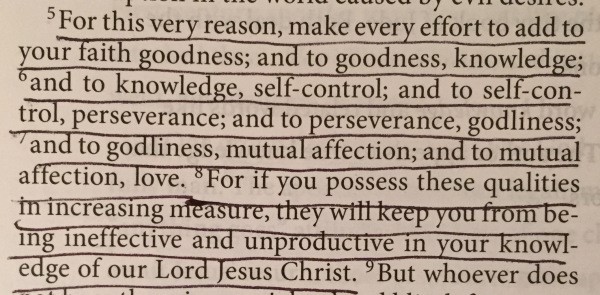
Keep growing (2 Peter 1:5-8)





